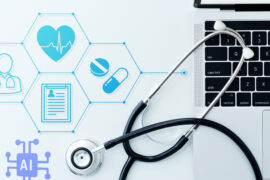The Growing Impact of AI in Healthcare Industry

Artificial Intelligence (AI) is not only saving lives, but also improving the entire healthcare industry. The market is expected to see significant growth in the next few years. According to a report from Grand View Research, the global industry for AI in healthcare will exceed $31 billion by the year 2025. The application of AI in healthcare can provide sustainable improvements in all areas, from diagnostics to treatment.
AI facilitates and strengthens human work, but does not replace the work of physicians or other healthcare professionals. Supporting staff with a variety of tasks, from administrative data collection, to clinical documentation and patient outreach, as well as image analysis, patient monitoring, and medical device automation, the future of AI in healthcare is bright.
IBM Watson and Google’s Deep Mind have shown that their AI can beat humans in tasks like chess, Go, and other games. Remarkably, both of these applications, from IBM and Google, are being used in healthcare. IBM Watson is being utilized for research concerning diabetes management, cancer treatment, and drug development. Google’s Deep Mind is beginning to develop applications involving mobile medical assistants, diagnostics based on medical imaging, and predicting patient deterioration.
For a better idea of what artificial intelligence in healthcare is prepared to look like, let’s look at some emerging technologies:
Robotic Surgeries
AI systems for diagnosis mostly use data collection and analysis, but these systems can also be programmed to control robotic surgeons that assist in jobs such as suturing and knot-tying. John Hopkins University recently demonstrated that its smart tissue autonomous robot (STAR) can outperform human surgeons in some surgical procedures, such as bowel anastomosis in animals. While a surgery fully performed by a robot may not be in the cards just yet, AI assisted surgery is of interest to researchers as it can reduce the risk of human error.
Image Analysis
AI in healthcare allows systems to analyze medical images and assist with diagnosis, helping physicians and saving lives. Indeed, it is possible that a trained AI could detect cancerous cells earlier than humans. Taking the strain off of doctors, while also providing an earlier diagnosis, image analysis offers significant improvements.
Precision Medicine
Precision medicine tailors medications to individuals or groups of patients based on data collected from disease profiles or treatment responses. It uses individual biology rather than population biology, and collects data from individuals rather than using data from large populations to predict an individual’s medical needs. Along with earlier and more efficient treatment options, precision medicine reduces costs, adverse drug responses, and increases the likelihood of recovery.
EHR / Diagnosis Automation
More often than not, a patient comes to a doctor and presents multiple symptoms that could be signs of many different conditions. With AI, the system can provide practitioners with data needed to accurately diagnose, develop a treatment plan, and aid in early detection. AI learns from data, resulting in more accurate results based on feedback from various sources. Doctors, nurses, and researchers give valuable feedback to AI systems to ensure maximum accuracy.
Data from x-rays, physical examinations, and medical device recordings can all be reviewed by AI rather than individually reviewed by medical experts. AI can detect diseases based on feedback from healthcare workers. Fusemachines is creating AI to assist healthcare workers with Diagnosis Automation. Check out our case study to learn more.
Drug Development
Developing drugs is one of the most time-consuming and expensive processes in healthcare. With the help of AI, both the amount of time and money put into drug development can be reduced. AI can assist researchers with clinical trials by selecting the best candidates or analyzing mass amounts of data. Fusemachines was able to help a US based biotech company research therapeutic proteins that help cells live longer and regenerate by developing an AI system that utilizes machine learning and natural language processing. This saved the company both time and money by reducing the research phase to merely 6 months.
Bottom Line
AI is improving the healthcare industry in unimaginable ways. From earlier diagnosis, to more precise treatments tailored to individual patients, AI in healthcare is changing the industry for the better.
Ready to explore how Fusemachines and AI can help your business? Click here


